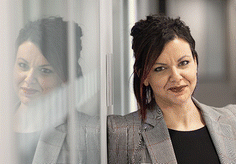Materials Horizons Emerging Investigator Series: Professor Francesca Santoro, Forschungszentrum Jülich and RWTH Aachen, Germany
Abstract
Our Emerging Investigator Series features exceptional work by early-career researchers working in the field of materials science.
Francesca Santoro received her Bachelor's and Master's degrees in biomedical engineering from the ‘Federico II’ University of Naples (Italy) with specialization in biomaterials in 2010. She received a PhD in 2014 in electrical engineering and information technology in a joint partnership between the RWTH Aachen and the Forschungszentrum Jülich (Germany). In 2014, she joined the Chemistry Department at Stanford University (USA) as a postdoctoral researcher. She joined Istituto Italiano di Tecnologia in 2017 as the principal investigator of the Tissue Electronics group. She has been awarded the MIT Technology Review Under 35 Innovator ITALIA and EUROPE (2018); has been included in the lists of Inspiring Fifty Italy (2021) and Europe, and Unstoppable Women Italy (2021–2024); and was the winner of the Falling Walls Science Breakthrough of the Year in Engineering and Technology (2021).
She is one of the PIs of the Interstellar Initiative by the New York Academy of Science (2021) and was the recipient of the Early Career Award from the German National Academy of Science Leopoldina (2022). Since 2022, she has been a professor at RWTH Aachen and Forschungszentrum Jülich leading the Neuroelectronic Interfaces Lab.
Read Professor Francesca Santoro's Emerging Investigator Series article ‘An organic brain-inspired platform with neurotransmitter closed-loop control, actuation and reinforcement learning’ ( https://doi.org/10.1039/D3MH02202A ) and read more about her in the interview below:
Materials Horizons (MH): Your recent Materials Horizons Communication reports a brain-inspired closed-loop system for motor control and actuation tasks. How has your research evolved from your first article to this most recent article and where do you see your research going in the future?
Francesca Santoro (FS): My first article was published in 2013 during my PhD where we featured dendritic-like electrodes for cell interfacing. The exciting part is that designing biomimetic and more specific neurohybrid interfaces is still a core focus of my research, which from the materials design point of view we tackle by developing neuromorphic biomaterials.
MH: What aspect of your work are you most excited about at the moment?
FS: Bridging together materials design for neuromorphic computing and neuronal bioelectronic interfaces.
MH: In your opinion, what are the most important questions to be asked/answered in this field of research?
FS: Currently designing neuronal interfaces should go beyond conventional materials engineering in terms of architectures (towards 3D adaptive interfaces) as well as on-chip computing capabilities to empower closed-loop interactive neuron-like devices.
MH: What do you find most challenging about your research?
FS: Finding a common language and gears between engineers, chemists, physicists, and neuroscientists to work all together on neuroengineering.
MH: In which upcoming conferences or events may our readers meet you?
FS: Typically MRS Fall and Spring are my favourite in the year.
MH: How do you spend your spare time?
FS: Cooking traditional southern Italian food, travelling and exploring a new spot in the city where I live every time I get a chance.
MH: Can you share one piece of career-related advice or wisdom with other early career scientists?
FS: Be perseverant and curious.
| This journal is © The Royal Society of Chemistry 2024 |

